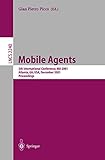Mobile Agents [electronic resource] : 5th International Conference, MA 2001 Atlanta, GA, USA, December 2–4, 2001 Proceedings / edited by Gian Pietro Picco.
Material type: TextSeries: Lecture Notes in Computer Science ; 2240Publisher: Berlin, Heidelberg : Springer Berlin Heidelberg, 2001Description: XII, 284 p. online resourceContent type: text Media type: computer Carrier type: online resourceISBN: 9783540456476Subject(s): Computer science | Computer Communication Networks | Software engineering | Operating systems (Computers) | Artificial intelligence | Computer Science | Computer Communication Networks | Programming Techniques | Software Engineering | Operating Systems | Artificial Intelligence (incl. Robotics)Additional physical formats: Printed edition:: No titleDDC classification: 004.6 LOC classification: TK5105.5-5105.9Online resources: Click here to access online
TextSeries: Lecture Notes in Computer Science ; 2240Publisher: Berlin, Heidelberg : Springer Berlin Heidelberg, 2001Description: XII, 284 p. online resourceContent type: text Media type: computer Carrier type: online resourceISBN: 9783540456476Subject(s): Computer science | Computer Communication Networks | Software engineering | Operating systems (Computers) | Artificial intelligence | Computer Science | Computer Communication Networks | Programming Techniques | Software Engineering | Operating Systems | Artificial Intelligence (incl. Robotics)Additional physical formats: Printed edition:: No titleDDC classification: 004.6 LOC classification: TK5105.5-5105.9Online resources: Click here to access online  E-BOOKS
E-BOOKS
| Current library | Home library | Call number | Materials specified | URL | Status | Date due | Barcode |
|---|---|---|---|---|---|---|---|
| IMSc Library | IMSc Library | Link to resource | Available | EBK5497 |
Security -- On the Robustness of Some Cryptographic Protocols for Mobile Agent Protection -- Trust Relationships in a Mobile Agent System -- Evaluating the Security of Three Java-Based Mobile Agent Systems -- Models and Architectures -- Formal Specification and Verification of Mobile Agent Data Integrity Properties: A Case Study -- Lime Revisited -- Dynamic Adaptation of Mobile Agents in Heterogenous Environments -- Applications -- Fast File Access for Fast Agents -- Flying Emulator: Rapid Building and Testing of Networked Applications for Mobile Computers -- Crawlets: Agents for High Performance Web Search Engines -- Communication -- An Efficient Mailbox-Based Algorithm for Message Delivery in Mobile Agent Systems -- Using Predicates for Specifying Targets of Migration and Messages in a Peer-to-Peer Mobile Agent Environment -- A Scalable and Secure Global Tracking Service for Mobile Agents -- Run-Time Support -- Translating Strong Mobility into Weak Mobility -- Transparent Migration of Mobile Agents Using the Java Platform Debugger Architecture -- Portable Resource Reification in Java-Based Mobile Agent Systems -- Quantitative Evaluation and Benchmarking -- Mobile-Agent versus Client/Server Performance: Scalability in an Information-Retrieval Task -- Performance Evaluation of Mobile-Agent Middleware: A Hierarchical Approach -- Scheduling Multi-task Agents.
Recent years have witnessed the appearance of new paradigms for designing distributed applications where the application components can be relocated - namically across the hosts of the network. This form of code mobility lays the foundation for a new generation of technologies, architectures, models, and - plications in which the location at which the code is executed comes under the control of the designer, rather than simply being a con?guration accident. Among the various ?avors of mobile code, the mobile agent paradigm has become particularly popular. Mobile agents are programs able to determine - tonomously their own migration to a di?erent host, and still retain their code and state (or at least a portion thereof). Thus, distributed computations do not necessarily unfold as a sequence of requests and replies between clients and - mote servers, rather they encompass one or more visits of one or more mobile agents to the nodes involved. Mobile code and mobile agents hold the potential to shape the next gene- tion of technologies and models for distributed computation. The ?rst steps of this process are already evident today: Web applets provide a case for the least sophisticated form of mobile code, Java-based distributed middleware makes - creasing use of mobile code, and the ?rst commercial applications using mobile agents are starting to appear.


There are no comments on this title.